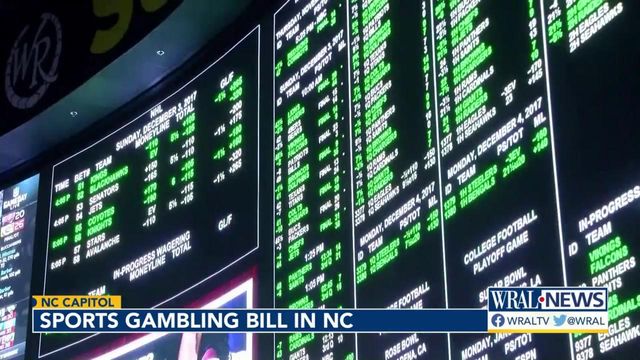North Carolina lawmakers to consider two sports gambling bills
A new proposal would raise the fees and tax rate paid by sports wagering operators in the state. The two bills will be heard in a House committee next week, according to the bill's sponsor, Rep. Jason Saine.
Posted — UpdatedNorth Carolina lawmakers next week will consider two bills to legalize online sports gambling in the state.
The bills are intended to pass in tandem. Senate Bill 688 passed a divided state Senate last year. It has been awaiting action in the House throughout the current legislative session. The House Judiciary Committee will hear the bill along with Senate Bill 38—an unrelated bill that will be gutted and amended to be an accompanying sports gambling measure—on Tuesday, Republican Rep. Jason Saine, the bill's House sponsor, told WRAL News on Thursday.
WRAL News obtained a preliminary version of the new bill, which was sent to stakeholders Thursday. The version does not allow for betting on horse races, but that will be added to the bill before its hearing on Tuesday.
Said Saine, R-Lincoln: "We had members that requested that, said 'I would probably like to support it, but if it had this,' Okay, fine." Sen. Paul Lowe, D-Forsyth, has been a proponent of adding horse racing to the sports gambling legislation. Lowe is a co-sponsor of Senate Bill 688.
The second bill would have to go back to the Senate for a final vote. Lawmakers are expected to conclude the session by the end of June.
At least 20 states, including Virginia and Tennessee, have legalized online sports gambling.
"September, October, I don't think it's unreasonable. I think it's probably a little later," said Saine, chairman of the House appropriations committee. "A lot of sports right at the end of the year, first of the year, so hopefully we're there. Again, I'd hate to lose that revenue. But we're not going to go too fast to where we can't handle it."
Proposed changes
Proposed changes to SB688 would:
• Increase the tax rate from 8% to 14%.
• Change the tax from a tax on adjusted gross revenue to an excise tax.
• Double five-year license fee from $500,000 to $1 million.
• Increase the license renewal fee from $100,000 to $1 million.
• Increase fees on service provider licenses from $25,000 to $50,000 and renewals from $10,000 to $50,000.
• Increase fees on supplier licenses from $15,000 to $30,000 and renewals from $5,000 to $30,000.
• Allow wagering on horse races, which isn’t allowed in current SB 688 and not in preliminary version of new legislation, but is expected to be added before Tuesday’s hearing.
• Expand definition of sports facility that is allowed to have on-premise sports lounges to include facilities that host NASCAR races (with minimum of 17,000 seats), facilities that host professional golf tournaments with more than 50,000 live spectators anticipated to attend and facilities that are the home locations of teams in Major League Baseball, Major League Soccer, the National Basketball Association, the National Football League and the National Hockey League. North Carolina does not currently have an MLB team.
• Modify revenue distribution. The Department of Revenue gets up to $500,000 for administrative expenses off the top. The remaining net proceeds of the tax collected is distributed as follows: 50% to the newly created North Carolina Major Events, Games, and Attractions Fund; 5% to the North Carolina State Lottery Commission; $1 million to the Department of Health and Human Services for gambling addiction and education programs; and the remainder to the General Fund.
Related Topics
• Credits
Copyright 2024 by Capitol Broadcasting Company. All rights reserved. This material may not be published, broadcast, rewritten or redistributed.






